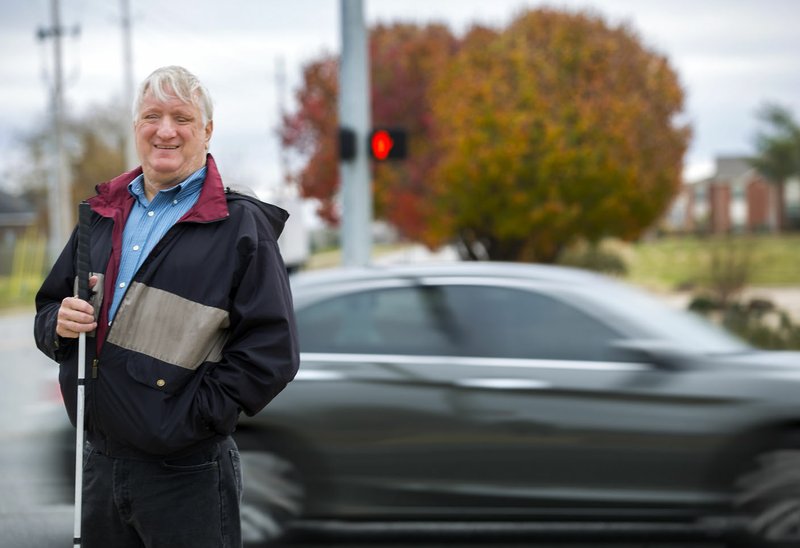BENTONVILLE -- David Henry can access the north side of Southwest 14th Street by foot since the city installed its first audible crosswalk signals at the Been Road intersection.
Henry is blind. He lives less than a quarter-mile south of the intersection.
Bentonville’s first audible crosswalk was installed at the intersection of Southwest 14th Street and Been Road/Turnbridge Drive.
The equipment cost $6,000.
Source: Staff Report
He took a walk to it to demonstrate the new signals Wednesday. Henry talked with ease as he walked with confidence, his walking cane creating a soft cadence as he repeatedly scratched it along the sidewalk in a curve until it tapped the edge of the grass.
Henry didn't cross Southwest 14th Street before the audible crosswalks were installed. He could, having been trained to safely maneuver across busy roads, but he would have to stay at the intersection for a while and learn the traffic patterns by listening to them, he said.
"I remember when I was driving, 14th Street was a dangerous street whether you could see or not," he said.
Henry developed cataracts at age 13 and had several surgeries on each eye by age 18. The retina in his left eye tore twice while he studying at the University of Arkansas, which eventually left that eye blind.
Life became visually one-dimensional, but Henry adjusted, even continuing to drive. He had no peripheral vision so he had to turn his head a lot, he said.
The sight in his right eye continued to get worse with glaucoma. Henry gave up driving in 2003 and lost all eyesight in 2007.
Henry's cane hits the sidewalk's end on the east side of Been Road, which ends about 75 to 100 yards short of the intersection with Southwest 14th Street. He explains this is where he crosses then turns left to do so. He finds the curb, then waits. The silent pause extends a little longer.
"I'm waiting for that car," he says finally. There's no car in sight on Been Road. "I can't quite tell how far off he is."
About two seconds later a black Jeep Cherokee approaches from the south.
"It's not a matter of better hearing," he said. "It's just refocused."
The chirping of the audible pedestrian signals can be heard as Henry closes in on the intersection. The arrow on the signal button is raised, making it more identifiable when touched.
A loud voice says, "Wait," then informs Henry when it's safe to walk north across Southwest 14th Street. The voice then counts down the seconds as they tick down on the visual sign letting whoever is crossing know how much time he has.
"From each pole, you can go either direction," said Brad Conley, with the Transportation Department. "We set a minimum threshold of volume and a maximum threshold of volume, and it will vary by the road noise."
Conley said Henry assisted with testing the system after it was installed. It went live in early October.
Traffic counts at that intersection weren't readily available.
It was Octavio Sanchez, Ward 4 alderman, who approached the city in the spring about increasing the safety of the intersection for the visually impaired. He and Henry attend the same church, First United Methodist.
Mike Churchwell, transportation director, said he never thought of audible crosswalks being a need before, but was on board with providing a solution, Sanchez said.
"The purpose of the city is to help its citizens," he said, explaining the idea was well received because the general philosophy of the city administrators is to meet the needs of its people.
The system equipment cost just less than $6,000, according to transportation officials.
It would be too expensive to install them at every intersection, Churchwell said.
"But obviously where it's indicated that there is definitely a need, we will look at it and take it into consideration," he said.
It's difficult to say how many blind people live in the area, but Henry said he knows of about a dozen. He led a support group for the blind a few years ago, but it disbanded as several members had issues with transportation to get there, he said.
Henry spoke of his time at the Colorado Center for the Blind, one of three National Federation of the Blind schools in the country, on the walk back to his house. It was at that nine-month program where he learned to problem solve, and he gained confidence living without vision, he said.
Henry now lives by himself, does all his own housework and cooking. He serves as Arkansas' legislative director for the National Federation of the Blind. He also is the vice president of the Bentonville Lions Club, where he serves as the eyeglass chairman.
"Which I've always thought was an irony. People are getting their eyeglasses from a blind man," he said, laughing.
His demeanor is optimistic. He spoke of his love of travel and a recent cruise to the Panama Canal he recently returned from.
"I don't let my blindness define me," he said. "It's just a characteristic."
It's things like audible crosswalks that can make life easier and safer.
"It's wonderful that they've done this," Henry said of Sanchez, Churchwell and Conley. "They just really did go to bat for me. I'm just really appreciative."
NW News on 11/28/2015
